1. Early Life and Youth Career
Raúl González Blanco's football journey began in his hometown of Madrid, Spain, where his early talent quickly became apparent, leading him through local clubs and into the prestigious youth academies of Atlético Madrid and Real Madrid.
1.1. Early Life
Born on June 27, 1977, Raúl grew up in the San Cristóbal de los Ángeles neighborhood of Madrid. His father, Pedro, an engineer, was a keen supporter of Atlético Madrid, which brought football close to Raúl from a young age. At the age of 10, he joined a school club team called Carranzas, where his exceptional goal-scoring talent was already evident.
1.2. Youth Club Career
Raúl's youth career began at his local club, CD San Cristóbal de los Ángeles, playing for their Alevín (under-10) and Infantil (under-12) teams. His talent soon caught the eye of Atlético Madrid, and he joined their Infantil team, later winning a national title with their Cadete (under-14) team. However, his time at Atlético was cut short due to the then-president Jesús Gil's decision to close the club's youth academy as a cost-saving measure. This pivotal moment led Raúl to move to Real Madrid's Cadete team in La Fábrica, the club's renowned youth academy, in 1992. Over the next two years, he rapidly progressed through Real Madrid's youth ranks, playing for their Juvenil C, Juvenil B, and Juvenil A teams. During his time in the Real Madrid youth setup, Raúl also won the prestigious Dallas Cup youth tournament in both 1993 and 1994.
2. Club Career
Raúl González Blanco enjoyed a distinguished club career spanning over two decades, primarily with Real Madrid, followed by successful spells at Schalke 04, Al Sadd, and the New York Cosmos.
2.1. Real Madrid
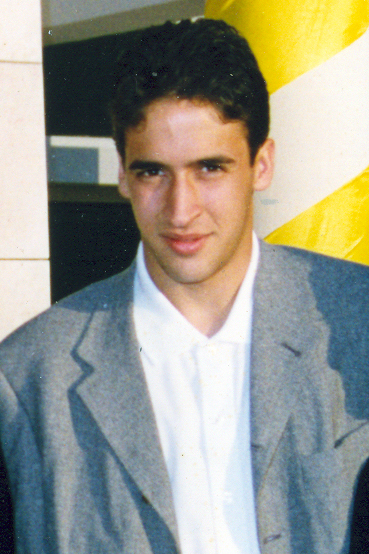
Raúl began his professional career during the 1994-95 season with Real Madrid C, the club's fourth-tier reserve team. He quickly impressed, scoring 16 goals in just 7 games, including an impressive five goals in one match against CD Corralejo. His exceptional performances led to a swift promotion to the first team by coach Jorge Valdano, who famously brought him in to replace the legendary Emilio Butragueño, symbolizing a "passing of the crown." Raúl made his professional debut on October 29, 1994, at just 17 years and 124 days old, in an away game against Real Zaragoza at La Romareda, where he assisted a goal for Iván Zamorano. Although he was the youngest player to debut for the senior side at the time, this record was later broken by Alberto Rivera in the same season. The following week, Raúl scored his first senior goal in his second game, a home debut against Madrid rivals and his former youth club, Atlético Madrid, in a fiercely contested derby match.
Fully establishing himself as a fixture in the first team, Raúl registered a total of nine goals in 28 appearances in his debut season, helping Real Madrid win the 1994-95 league championship. The 1995-96 season saw him score his first El Clásico goal against FC Barcelona and achieve his first professional hat-trick in the UEFA Champions League group stage against Ferencváros TC, becoming the youngest player to do so in the competition's history. Under coach Fabio Capello in the 1996-97 season, he was a central figure, scoring 21 La Liga goals and contributing significantly to another league title.
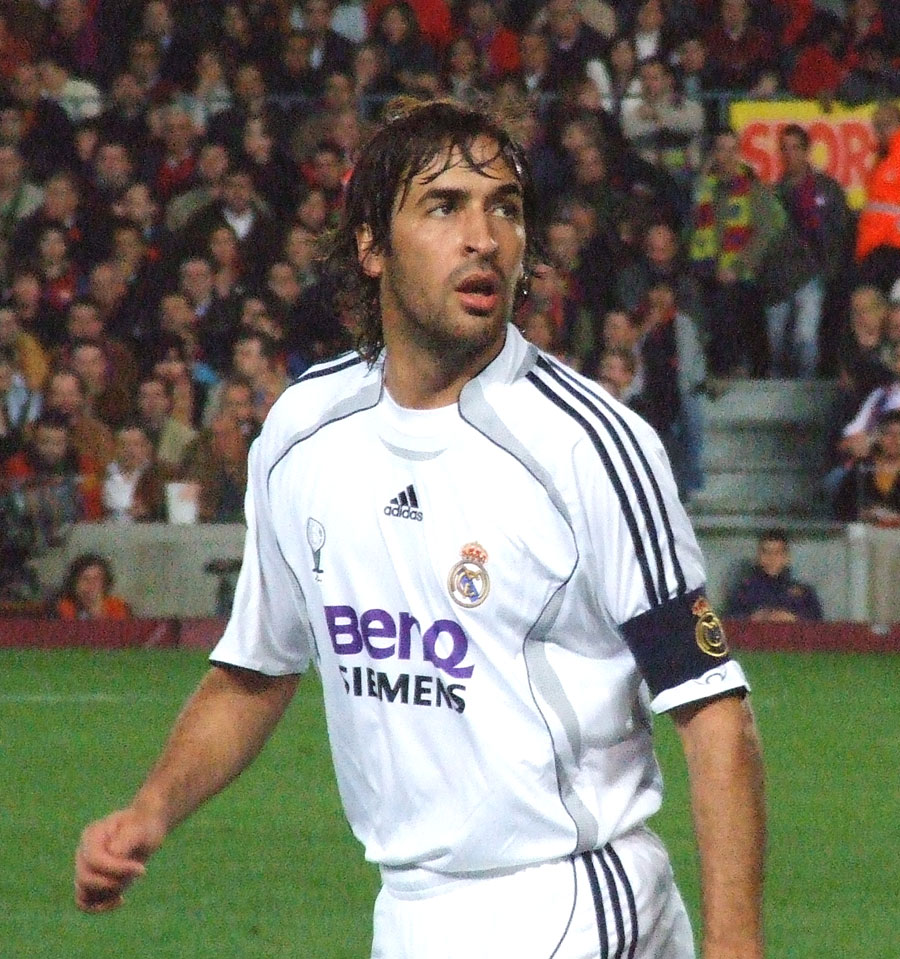
From 1998 to 2002, Raúl and Real Madrid achieved immense success in Europe, winning three UEFA Champions League titles in 1998, 2000, and 2002. He became the first player to score in two Champions League finals (since the competition was rebranded), scoring in the 2000 final against Valencia and the 2002 final against Bayer Leverkusen. During this period, he formed prolific scoring partnerships with Fernando Morientes and later Ronaldo. In the 1998 Intercontinental Cup against Vasco da Gama, he scored the decisive winning goal, earning him the tournament's Most Valuable Player award. In a fierce El Clásico at the Nou Camp in October 1999, Raúl famously silenced the hostile crowd of nearly 100,000 fans by putting a finger to his lips after scoring.
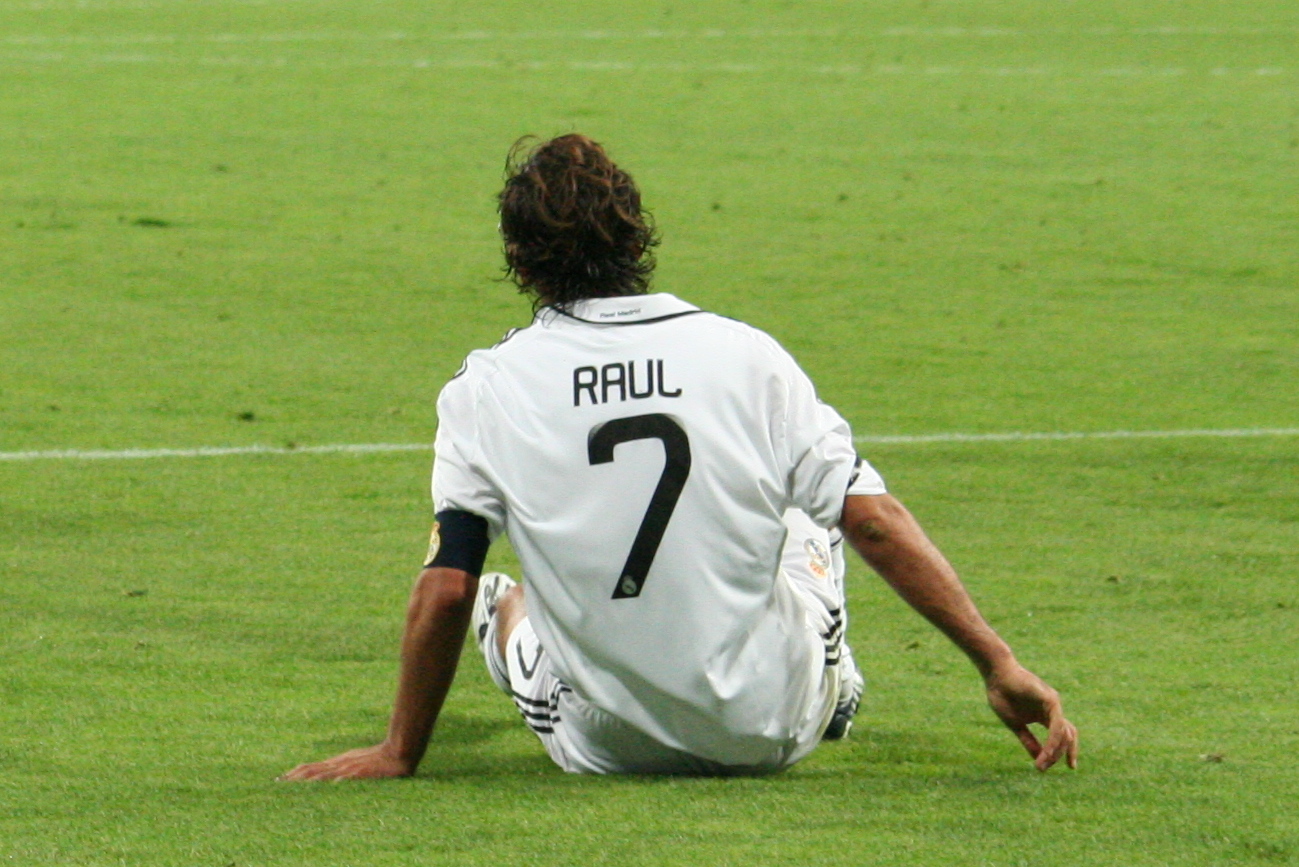
Raúl took over the captaincy of Real Madrid in 2003 after Fernando Hierro's departure, a responsibility he held until he left the club in 2010. Despite appearing in two Copa del Rey finals, in 2002 (where he scored) and 2004, he never lifted the domestic cup trophy. On September 28, 2005, he became the first player to score 50 Champions League goals in a 2-1 group stage win over Olympiacos, and also the first to reach 100 appearances in the competition.
Remarkably, Raúl holds the distinction of having never been sent off in his 17 years at the professional level. On November 11, 2008, he scored his 300th goal for Real Madrid with a hat-trick against Real Unión, though Real Madrid was eliminated from the Copa del Rey on away goals after a 6-6 aggregate draw. On February 15, 2009, he surpassed Alfredo Di Stéfano's long-standing club record of 307 goals by scoring his 309th goal for Real Madrid against Sporting de Gijón, ultimately accumulating 323 goals for the club. He is currently fifth on the all-time list of La Liga goalscorers.
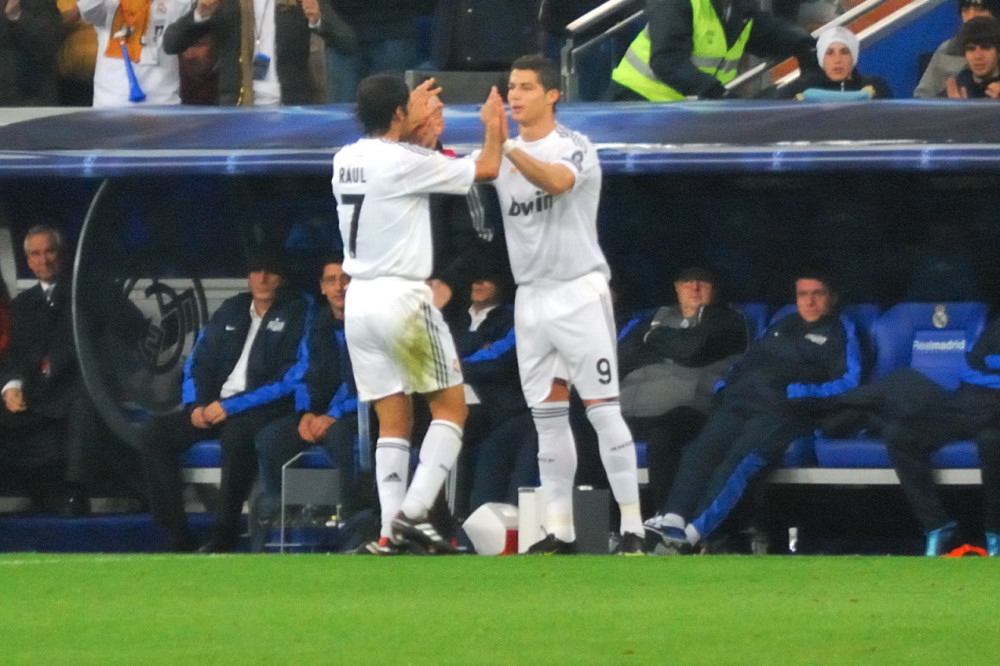
In 2008, Raúl and long-serving teammate Iker Casillas were awarded "contracts for life," stipulating annual renewals as long as they played 30 matches per season. On September 23, 2009, Raúl equalled Manolo Sanchís' league appearance record for Real Madrid, and he ranks second in La Liga for appearances overall, behind only Andoni Zubizarreta. Throughout his years of captaincy for both Real Madrid and the national team, Raúl became widely known as "El Capitán" (The Captain).
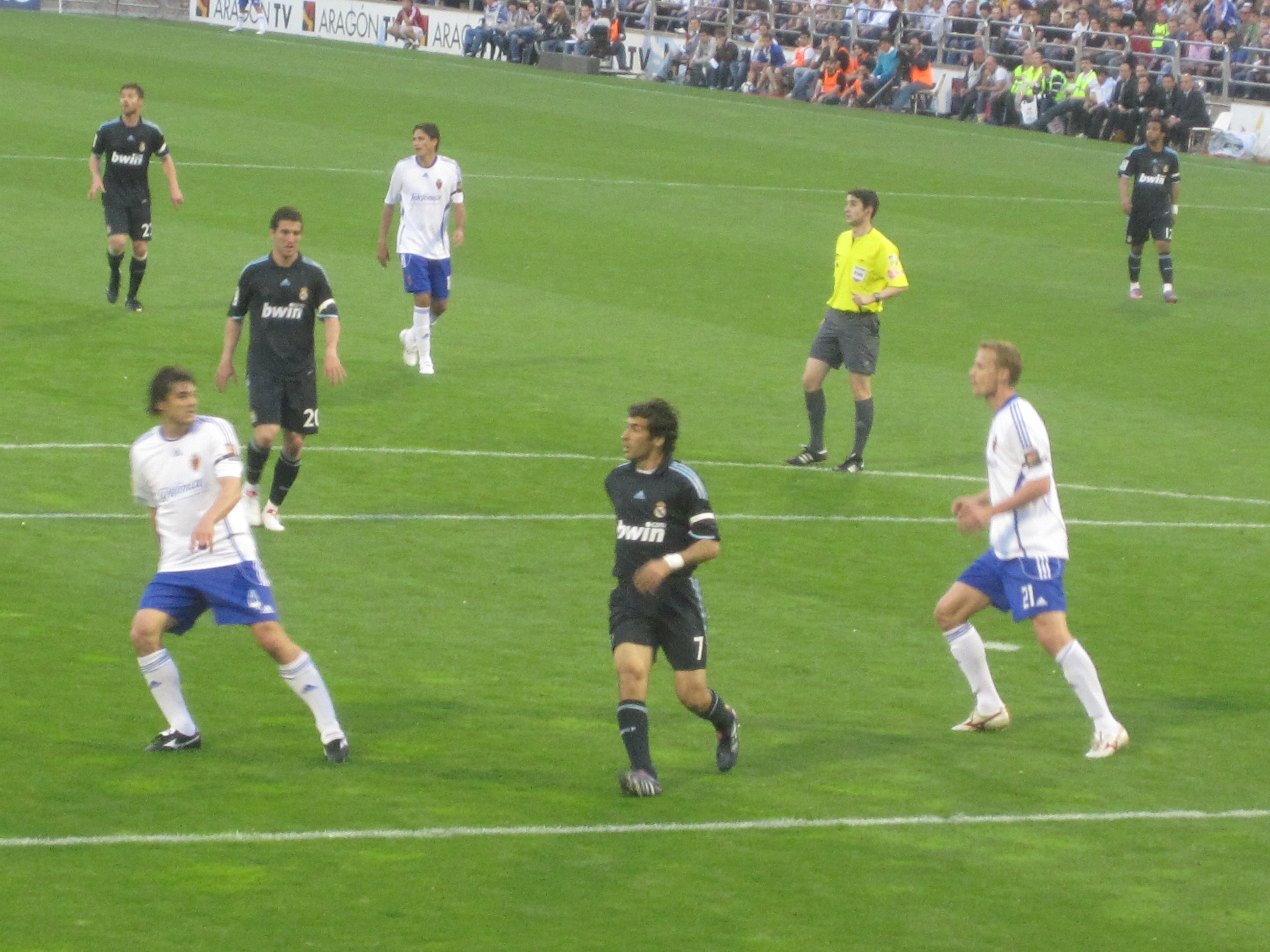
Raúl's final touch as a Real Madrid player before an injury sidelined him for the rest of the 2009-10 season was to score his last goal for the club. This occurred on April 24, 2010, in a 2-1 away victory against Real Zaragoza at La Romareda, coincidentally the very stadium where he made his professional debut in 1994. He scored in the 50th minute, just before being substituted for Karim Benzema due to his injury. On July 25, 2010, after 16 years, Real Madrid officially confirmed Raúl's departure from the club.
2.2. Schalke 04
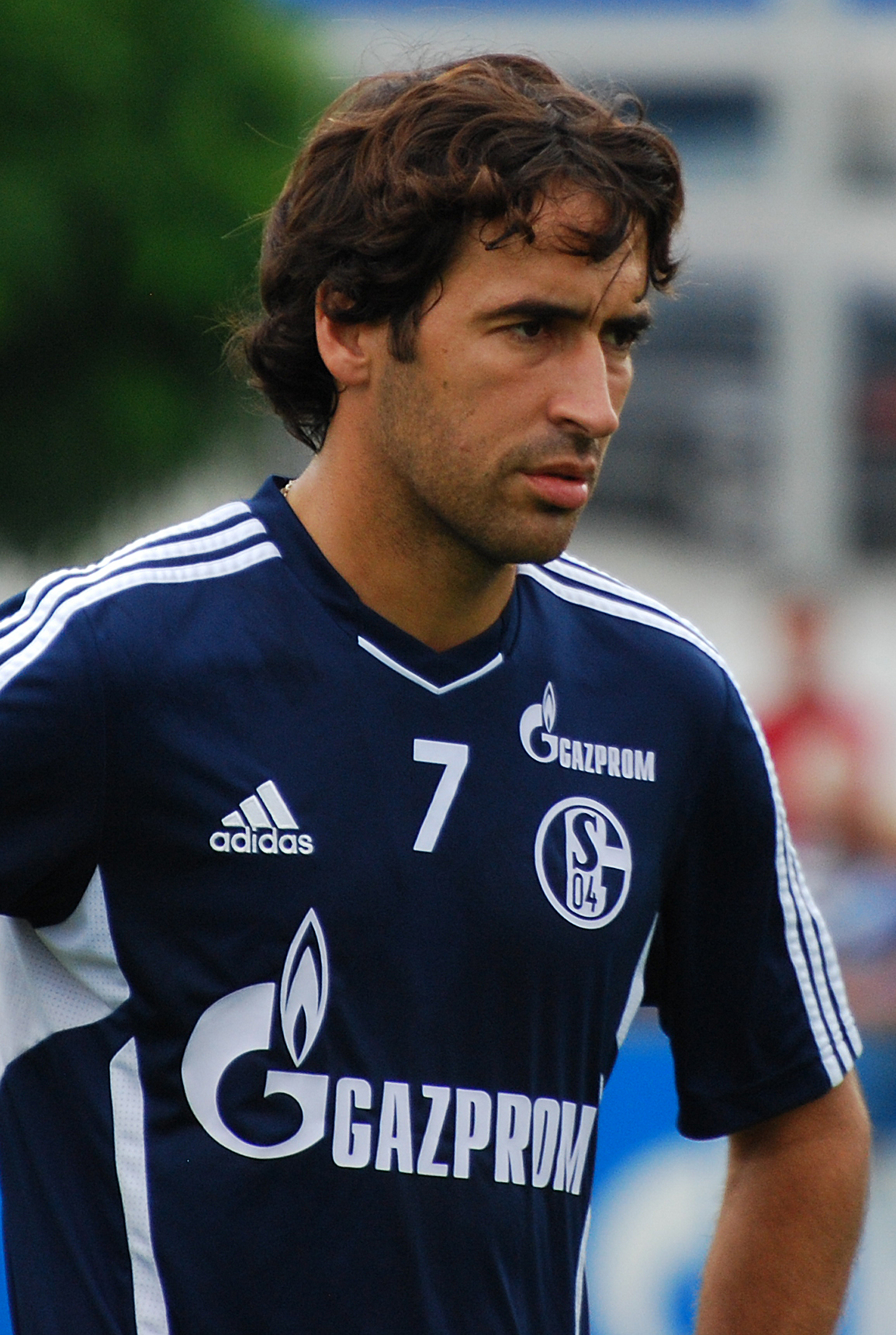
On July 28, 2010, Raúl signed a two-year contract with German club Schalke 04. Schalke head coach Felix Magath enthusiastically welcomed the signing, noting Raúl's "exceptional footballer and world-class striker" status. Raúl chose Schalke primarily because they had qualified for the 2010-11 UEFA Champions League.
His first goals for the club came on August 1, 2010, with a brace in a 3-1 pre-season victory over Bayern Munich in the final of the LIGA total! Cup 2010. A week later, he made his competitive debut in the 2010 DFL-Supercup against Bayern, though Schalke lost 2-0. Raúl's Bundesliga debut was on August 21, 2010, in a 2-1 defeat to Hamburger SV. He scored his first Bundesliga goal on September 25, 2010, in a 2-2 draw against Borussia Mönchengladbach. He quickly regained his goalscoring form, netting a brace against FC St. Pauli in a 3-0 win on November 5, and his first hat-trick for Schalke in a 4-0 victory over Werder Bremen on November 20. Another hat-trick followed on December 18 against 1. FC Köln in a 3-0 win.
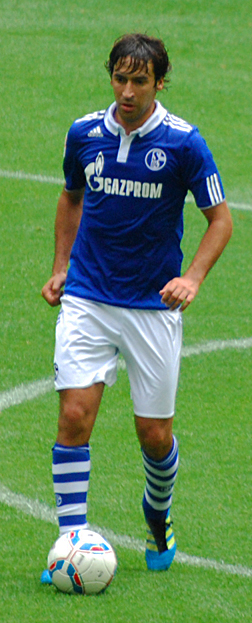
On March 2, 2011, Raúl scored a crucial goal in a 1-0 win over Bayern Munich in the semi-final of the 2010-11 DFB-Pokal. This victory propelled Schalke to their first DFB-Pokal final since 2005. Despite never winning a domestic cup with Real Madrid, Raúl finally achieved this milestone in his first season with Schalke, as they secured a commanding 5-0 victory over MSV Duisburg in the final at the Olympiastadion in Berlin. This success was followed by another trophy two months later on July 23, 2011, when Schalke defeated league champions Borussia Dortmund in the 2011 DFL-Supercup.
In European competitions, Raúl became the all-time leading goal scorer in all UEFA club competitions with 73 goals, surpassing Milan veteran Filippo Inzaghi. This tally included 71 goals in the Champions League (66 with Real Madrid and five with Schalke 04), plus two goals for Real Madrid in the 2000 UEFA Super Cup and the 1998 Intercontinental Cup. On October 22, 2010, Raúl's brace against Hapoel Tel Aviv in a 3-1 win tied him with German legend Gerd Müller for the most European goals. He definitively broke this record on February 15, 2011, scoring a crucial away goal against Valencia in the Champions League Round of 16, securing a 1-1 draw.
In the Champions League quarter-finals, Raúl scored two goals against Internazionale, one in a 5-2 away win at the San Siro and another in a 2-1 home win at the Veltins-Arena. Schalke advanced to the Champions League semi-finals for the first time in their history, where they faced Manchester United. Despite losing both legs (0-2 at home, 1-4 at Old Trafford), Raúl considered it an honor to have swapped shirts with Ryan Giggs. On November 19, 2011, he captained Schalke for the first time due to an injury to Benedikt Höwedes, scoring the second goal and assisting the fourth in a 4-0 home win against 1. FC Nürnberg.
Raúl scored another hat-trick against Werder Bremen on December 17, 2011, in a 5-0 victory that solidified Schalke's third-place position going into the winter break. On February 19, 2012, he scored the 400th goal of his career, comprising 323 for Real Madrid, 44 for Spain, and 33 for Schalke. On April 5, 2012, in the second leg of the UEFA Europa League match against Athletic Bilbao, he scored his 77th goal in a European competition. His outstanding performances in the European Cup that season earned him a spot in the competition's best eleven, as recognized by UEFA.
At a press conference on April 19, 2012, Raúl announced he would leave Schalke after his contract expired in June, stating that his "future is not in Europe." Raúl's impact at Schalke was so significant that the club initially decided to retire his number 7 shirt for an indefinite period upon his departure. However, the number 7 shirt was later reissued in 2013 to Schalke's new prodigy, Max Meyer.
2.3. Al Sadd
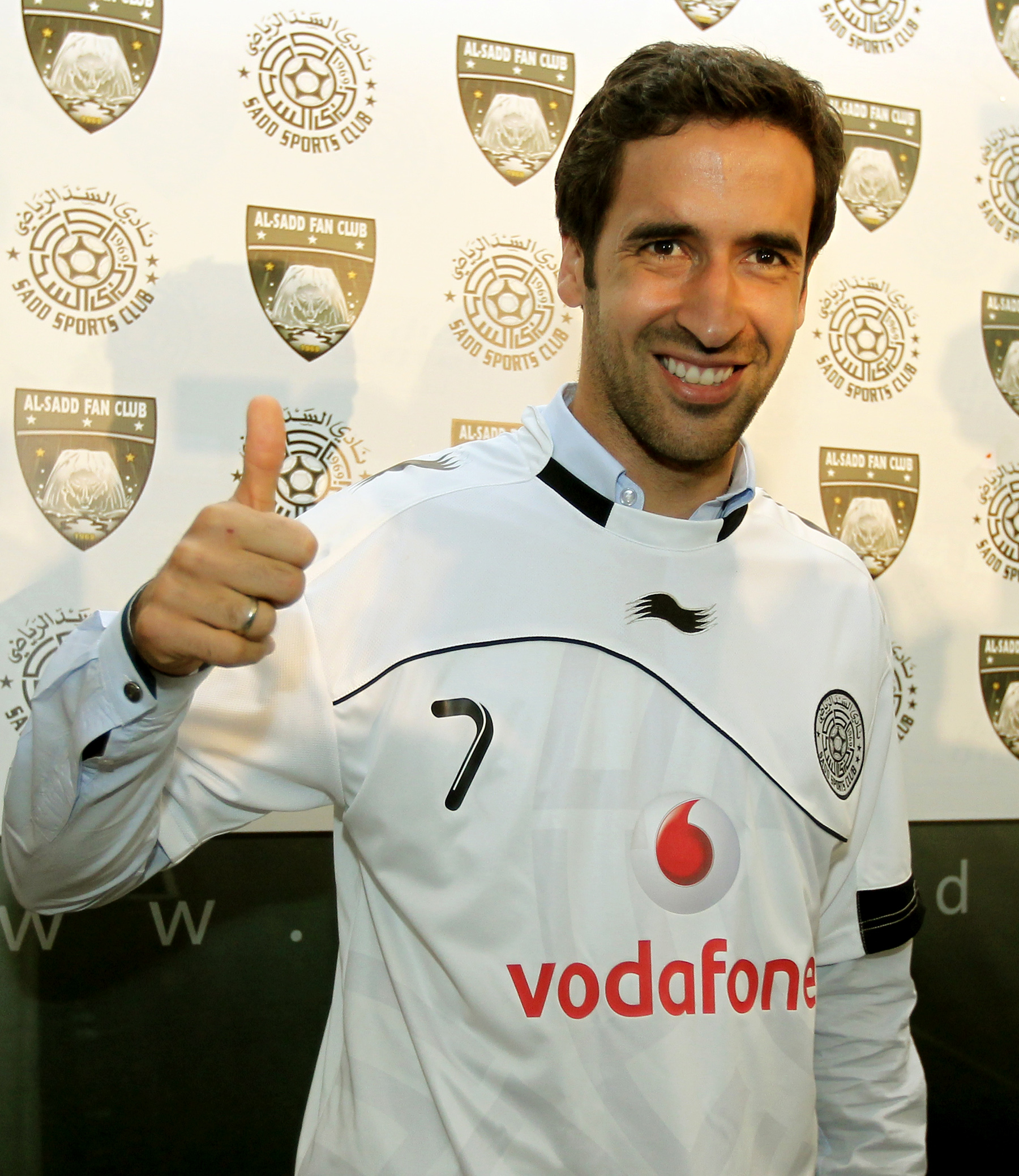
On May 12, 2012, it was announced that Raúl had signed a deal with Qatari football club Al Sadd for the 2012-13 Qatar Stars League season. He made his first competitive appearance for the club on August 5 in the 2012 Sheikh Jassem Cup, scoring a penalty in extra time to secure a 2-0 win against Mesaimeer. The veteran also took on the role of captain after Abdulla Koni was substituted during the match.
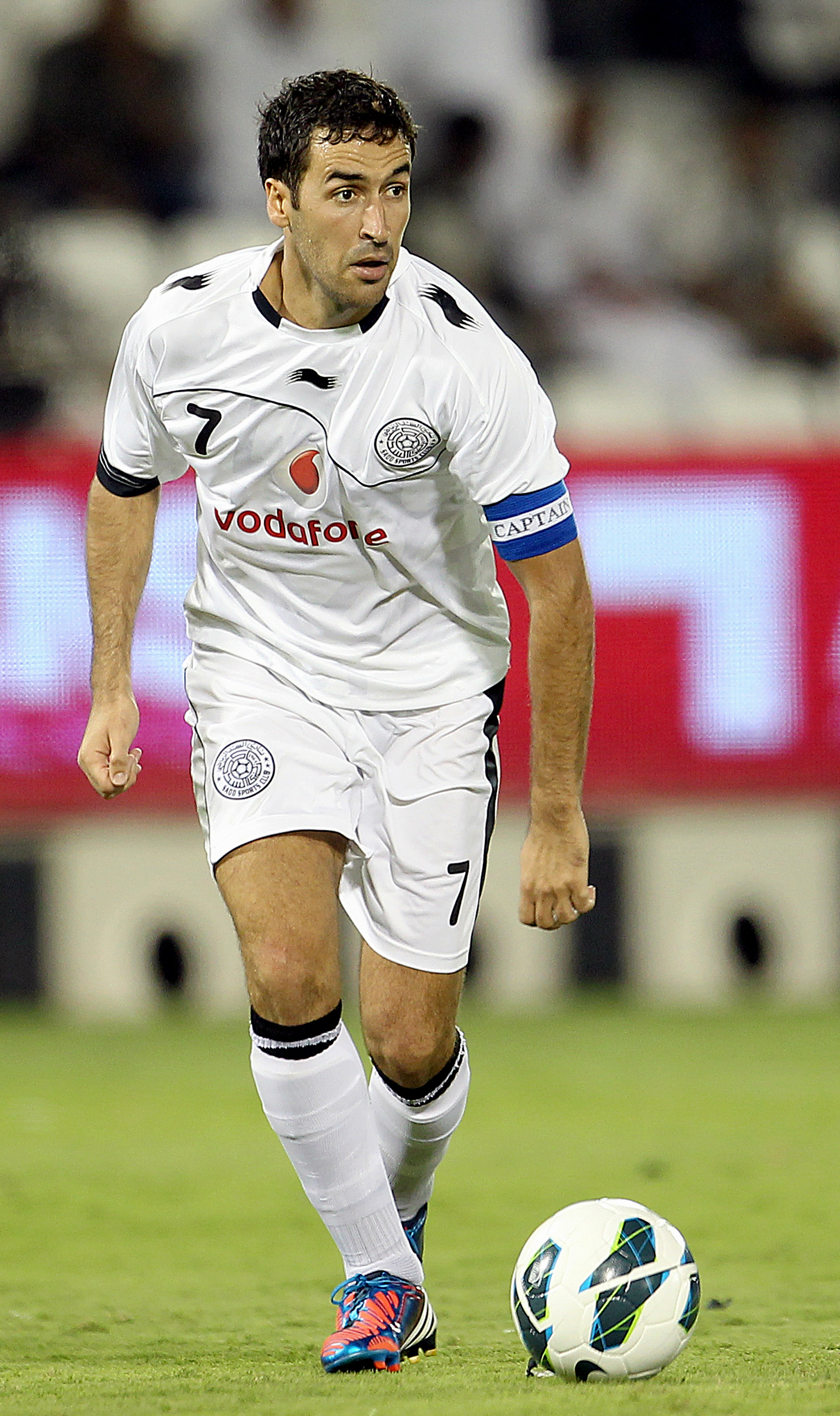
On April 13, 2013, Raúl captained Al Sadd to the 2012-13 Qatar Stars League title, their first in five years. He contributed 9 goals in 22 appearances to their championship success. He also scored in the 2013 Emir of Qatar Cup final, though Al Sadd lost to Al Rayyan. In May 2013, Raúl was presented with the QFA-sanctioned Fair Play Award.
On August 22, 2013, Raúl made a special return to Santiago Bernabéu to play for Real Madrid in the first half of the Trofeo Santiago Bernabéu, scoring the opening goal. He then played the second half for Al Sadd, as Real Madrid won the match 5-0. On March 5, 2014, Raúl announced his decision to retire from professional football at the end of the Qatari football season, concluding his 20-year playing career.
2.4. New York Cosmos
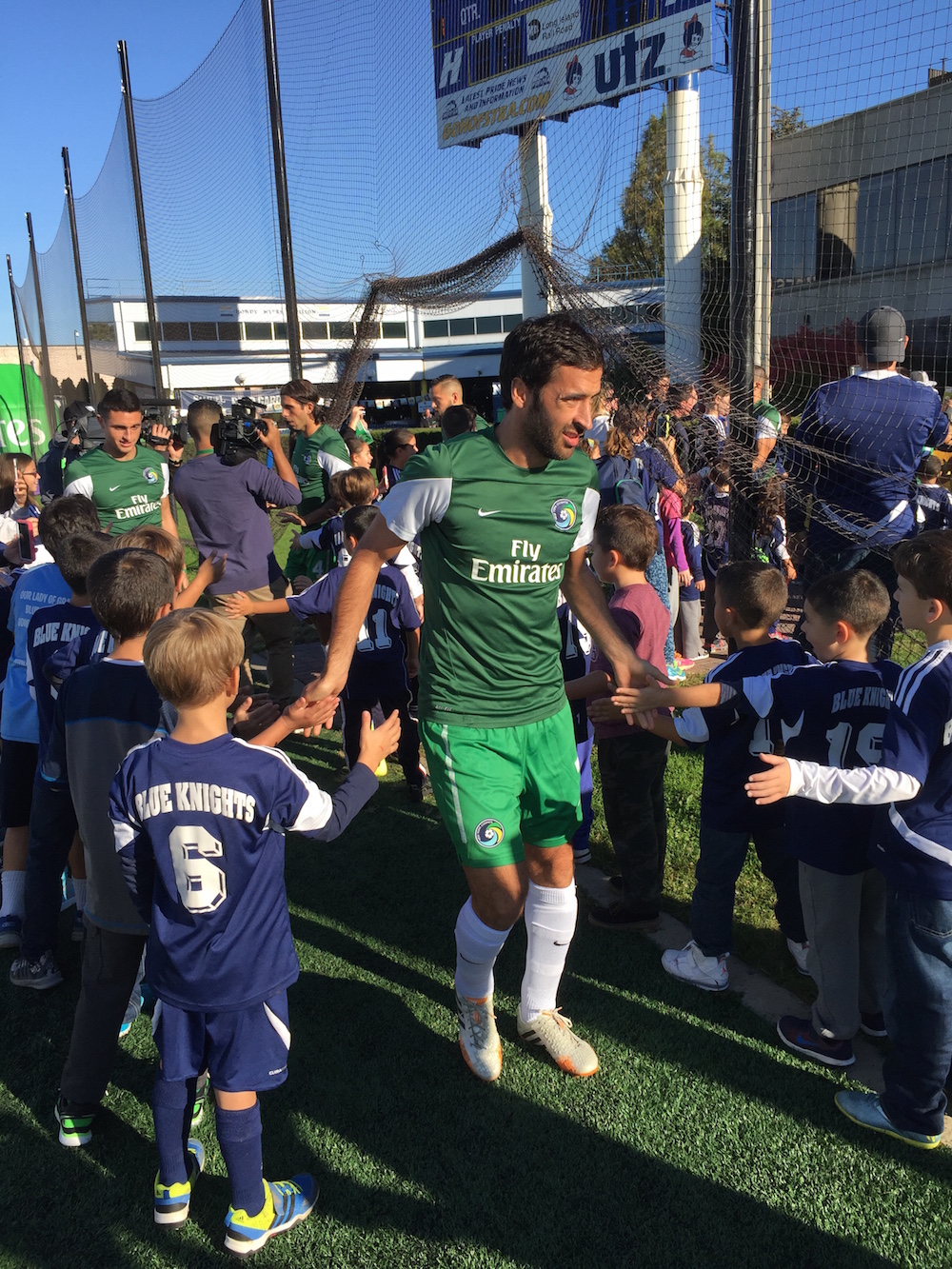
On October 30, 2014, Raúl reversed his retirement decision and signed with the New York Cosmos in the United States. Alongside his playing duties, he also took on a role as a technical advisor for the club's youth academy. He made his North American Soccer League (NASL) debut on April 4, 2015, in a 1-0 win against the Fort Lauderdale Strikers, a team partially owned by his former Real Madrid strike partner, Ronaldo. Raúl, however, left the game in the second half due to a hamstring injury. The following week, he scored his first goal for the Cosmos in a 1-1 draw against the Indy Eleven. He scored four times as the undefeated Cosmos won the spring season with five wins and five draws.
On October 16, 2015, Raúl announced once again that he would retire at the end of the season. The Cosmos concluded the regular season with the best record, earning the North American Supporters' Trophy. On November 7, he scored the winning goal in a 2-1 comeback victory against the Strikers in the semi-finals, securing a spot in Soccer Bowl 2015. Eight days later, the Cosmos won the Soccer Bowl by defeating the Ottawa Fury 3-2, with Raúl assisting the third and final goal for Gaston Cellerino's hat-trick. He reiterated his decision to retire after the Soccer Bowl, ending his remarkable playing career with a championship.
3. International Career
Raúl's international career with Spain spanned across various youth levels and the senior national team, where he became a prolific goalscorer.
3.1. Youth National Teams
Raúl began representing Spain at the youth level. He participated in the 1995 FIFA U-20 World Cup, scoring three goals in five matches. He was also a key member of the Spain U-21 side that reached the final of the 1996 UEFA European Under-21 Championship. In that final against Italy, he scored his team's temporary equalizer but later missed his penalty in the decisive shootout, which Italy won. In total, Raúl scored 17 goals across various Spanish youth national teams (U-18, U-20, U-21, and U-23).
3.2. Senior National Team
Raúl debuted for the Spanish senior squad on October 9, 1996, starting in a goalless 1998 FIFA World Cup qualification draw against the Czech Republic in Prague. On December 14, in his third international match against Yugoslavia at the Mestalla Stadium, he scored his first international goal in a 2-0 qualifying victory.
3.2.1. 1998 FIFA World Cup
At the final tournament in France, Raúl featured in every match as Spain were unexpectedly eliminated from Group D. He scored in their opening match, putting Spain 2-1 ahead, in an eventual 2-3 loss to Nigeria in Nantes. Despite assisting a goal in the third group match against Bulgaria, Spain finished with one win, one loss, and one draw, failing to advance to the knockout stage.
3.2.2. UEFA Euro 2000
Raúl was instrumental during the UEFA Euro 2000 qualifiers. On March 27, 1999, he scored four goals in Spain's dominant 9-0 rout of Austria. Four days later, he recorded a hat-trick in a 6-0 away win against San Marino in the same qualifying tournament. He was again on target against San Marino in a 9-0 home victory in Villarreal on June 5. In the Euro 2000 finals in Belgium and the Netherlands, Raúl played every minute of Spain's campaign. He scored the opening goal in their 2-1 win over Slovenia at the Amsterdam Arena. Spain were eliminated in the quarter-finals by eventual champions France; Raúl notably missed a last-minute penalty kick that would have sent the tie to extra time.
3.2.3. 2002 FIFA World Cup
At the 2002 FIFA World Cup in South Korea and Japan, Raúl played a pivotal role in the group stage. He opened the scoring in a 3-1 win over the Slovenes in Spain's first Group B match. He added two more goals in a thrilling 3-2 victory over South Africa in Daejeon, helping Spain advance as group winners. However, he suffered a groin injury in the Round of 16 win over the Republic of Ireland, which forced him to miss the remainder of the tournament. Spain were subsequently eliminated by co-hosts South Korea in the quarter-finals.
3.2.4. UEFA Euro 2004
On September 7, 2002, Raúl scored in a 2-0 away win over Greece in Euro 2004 qualifying, reaching 29 goals in 56 international games and equalling the national goalscoring record set by the recently retired Fernando Hierro. He broke this record on February 12, 2003, when he scored twice in a 3-1 friendly win over Germany at Son Moix in Palma, Mallorca. He started every match for Spain at the Euro 2004 finals in Portugal, but the team disappointingly crashed out at the group stage.
3.2.5. 2006 FIFA World Cup
Raúl earned his 89th cap on October 8, 2005, in a 2-0 away win over Belgium in 2006 World Cup qualifying, drawing level with Hierro as Spain's most-capped outfield player. However, he featured less frequently under new manager Luis Aragonés, who preferred to partner David Villa and Fernando Torres. At the final tournament in Germany, Raúl came on at half-time for Luis García in the second group match against Tunisia in Stuttgart, with Spain trailing 0-1. In the 72nd minute, he capitalized on a spilled shot from Cesc Fàbregas to score the equalizer from close range, as Spain eventually won 3-1.
On August 15, 2006, Raúl reached his 100th cap for Spain in a goalless friendly draw with Iceland in Reykjavík. His final appearance for the national team was on September 6, 2006, in a 2-3 defeat against Northern Ireland in Belfast, a match in which he hit the post late on. Raúl's 44 goals in 102 appearances made him Spain's all-time leading goalscorer for many years, a record later surpassed by David Villa in 2011. He is widely regarded as one of Spain's greatest ever players.
4. Managerial Career
After retiring as a player, Raúl transitioned into coaching, primarily within the Real Madrid academy.
4.1. Real Madrid Youth Teams
On August 17, 2018, Raúl was appointed as a youth coach at Real Madrid, taking charge of the Cadete B (under-15) squad. He quickly made an impact, guiding his team to victory in the Al Kass International Cup, a prestigious youth tournament, in his first season. In March 2019, following the dismissal of Álvaro Benito, Raúl was promoted to manage the Juvenil B (under-18) team. In July 2020, he served as interim manager for the Juvenil A (under-19) team after Daniel Poyatos departed for Panathinaikos FC. Under Raúl's temporary leadership, the Juvenil A squad achieved a historic milestone, reaching the UEFA Youth League final for the first time in the club's history. They went on to win the final against SL Benfica U-19 with a 3-2 victory, securing Real Madrid's first-ever UEFA Youth League title.
4.2. Real Madrid Castilla
On June 20, 2019, Raúl was officially appointed as the manager of Real Madrid Castilla, the reserve team of Real Madrid, which competes in the third tier of Spanish football. His debut match on August 25 was a 1-1 draw against Las Rozas in the Segunda División B. In 2021, Raúl's Castilla team qualified for the promotion playoffs, but they were eliminated by seeded team Ibiza after a goalless draw in the semi-finals. Following this, Raúl dismissed rumors that he would replace his former teammate Zinedine Zidane as the first-team manager, affirming his desire to continue at his "home" club.
Two years later, Castilla again reached the promotion playoffs in the newly formed Primera Federación. They faced Eldense in the final, with the second leg ending in a 3-3 draw after extra time. However, Eldense secured promotion due to their superior regular season finish. The press conference after the match was notably canceled for security reasons due to a pitch invasion and celebration by the home team's fans.
5. Player Profile
Raúl González Blanco is widely regarded as one of the greatest and most consistent forwards of his generation, known for his unique blend of skill, tactical intelligence, and unwavering commitment.
5.1. Style of Play
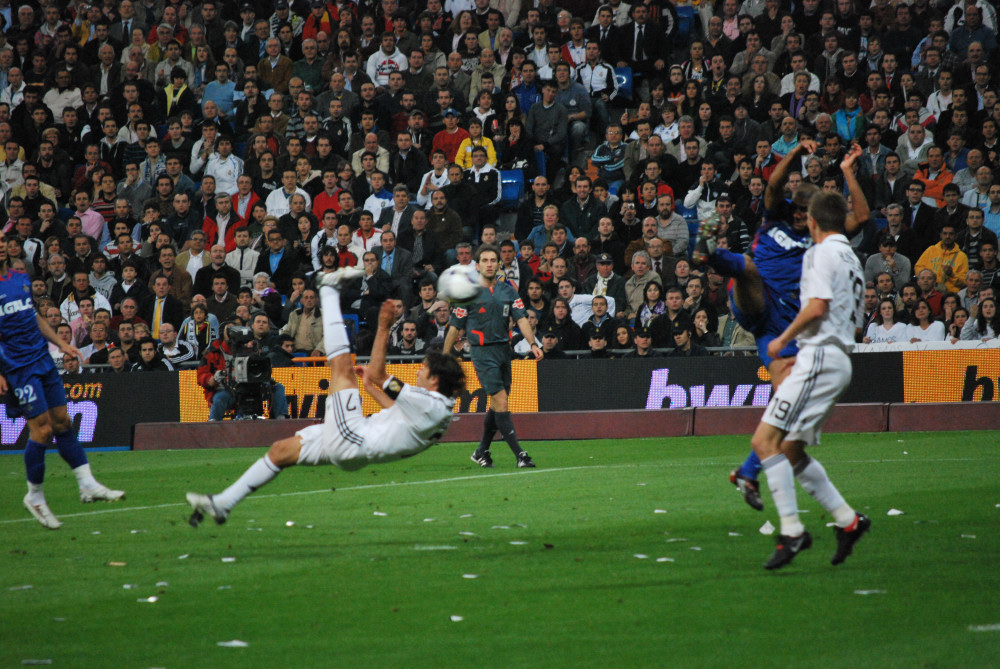
Raúl wore the number 7 jersey for most of his career and primarily operated as a centre-forward, though he was exceptionally versatile across the front line. He was also highly capable of playing as a number 10 behind the forwards or even as a left winger in his earlier career under managers like Fabio Capello. A quick and predominantly left-footed player, Raúl possessed the ability to score goals from various distances with precise and powerful shots. He was particularly known for his elegant chip goals. His technical attributes included excellent ball control, remarkable vision, and strong aerial ability, making him a potent threat in the box.
Beyond his prolific goalscoring, Raúl was a highly creative and exceptionally hardworking player. He was adept at assisting teammates, creating scoring opportunities, and contributing significantly to the team's offensive build-up. In the later stages of his career, he occasionally played as an attacking midfielder, demonstrating his tactical flexibility. During the "Galácticos" era at Real Madrid, when the team was often criticized for lacking defensive balance after the departure of Claude Makélélé, Raúl frequently dropped deeper to cover ground, apply pressure, and win back possession, showcasing his dedication to the team's defensive efforts. His profound understanding of space and anticipation of defensive weaknesses allowed him to consistently exploit gaps in opposing defenses. Teammates like Fernando Hierro affectionately nicknamed him "El Ferrari" for his speed, elegance, and performance. Former England defender Rio Ferdinand lauded Raúl as "the most intelligent player [he'd] played against," citing his clever movement off the ball. He was also a highly accurate penalty taker.
5.2. Reception and Legacy
Raúl's career is marked by numerous major achievements and a lasting impact on football. He is consistently hailed as one of the greatest forwards and one of Spain's greatest players of all time. His exceptional leadership and impeccable discipline are defining characteristics; throughout his extensive career, he never received a red card and was rarely booked, earning him the reputation of a true gentleman of fair play. His dedication, loyalty, and calm demeanor set him apart.
He was honored as the UEFA Club Forward of the Year for three consecutive seasons (1999-2000, 2000-01, and 2001-02), a testament to his consistent elite-level performance. In 1999, the IFFHS named him the world's top international goalscorer. He finished as runner-up for the Ballon d'Or in 2001 and secured the bronze award for FIFA World Player of the Year in the same year. In 2004, he was named in the prestigious FIFA 100 list of the world's greatest living players and included in UEFA's list of the 50 best European players from 1954-2004. He was also selected for the European Team of the Year by European Sports Media in 1997, 1999, and 2000.
Raúl's individual accolades include two Pichichi trophies (as La Liga's top scorer), five Don Balón Awards (as La Liga's Best Spanish Player), and the Best Player award at the 1998 Intercontinental Cup. He was also the top goalscorer in the UEFA Champions League in 1999-2000 and 2000-01. The Trofeo Alfredo Di Stéfano, inaugurated in 2008 to recognize the best player in La Liga, had Raúl as its inaugural recipient. In Germany, he received the Goal of the Year award in 2011 and 2013 (shared with Julian Draxler), and in Qatar, he was recognized with the Fair Play Award in 2013. His impact at Schalke was so profound that the club initially considered retiring his number 7 shirt.
Prominent figures in football have consistently praised Raúl. Fabio Capello called him "a winner" and "the legacy of Real Madrid." Former Germany legend Franz Beckenbauer described him as "one of the best in Europe... the soul of Real Madrid." Thierry Henry noted, "When he plays, his mind is only on goals. That is the essence of football." Sir Alex Ferguson stated in 2003, "Real bought many big players like Figo, Zidane, and Ronaldo. But I think the best player in the world is Raúl." Ottmar Hitzfeld expressed a desire to sign him, highlighting his maturity and experience. The loyalty and mutual respect between Raúl and his teammates were exemplified when Fernando Morientes wore Raúl's jersey under his own after a sensitive transfer situation. Former Real Madrid teammate Roberto Carlos also praised Raúl's contributions.
5.3. Criticism and Controversy
While widely lauded, Raúl's career was not entirely without critical perspectives, particularly regarding his influence within the locker room during his later years at Real Madrid. For instance, Cicinho, a former Real Madrid player, controversially claimed that the Real Madrid locker room was a "Raúl Madrid," implying that Raúl exerted undue influence. Cicinho also alleged that after the departures of Brazilian stars like Roberto Carlos and Ronaldo, Brazilian players faced "persecution" within the club. Additionally, the father of former Real Madrid youth product Javier Portillo was reported to have stated that his son's departure from the club was due to Raúl's influence.
6. Personal Life
Raúl married Mamen Sanz in 1999. The couple has four sons and one daughter. Their sons are named Jorge, Hugo, and twins Héctor and Mateo, while their daughter is named María. The names of his sons often reflect Raúl's football idols and significant figures in his career: Jorge was named after Jorge Valdano, who gave Raúl his professional debut; Hugo was named after his idol and Real Madrid striker Hugo Sánchez; Héctor was named after former Real Madrid player Héctor Rial; and Mateo was named after German legend Lothar Matthäus.
His sons have also pursued football. In 2016, Jorge was playing at Fordham Preparatory School in New York, and Hugo was part of the New York City FC's academy. In 2022, his daughter María was signed by Real Madrid's U15 football team, continuing the family's legacy with the club.
Beyond football, Raúl is known to be an avid reader, with Arturo Pérez-Reverte being one of his favorite authors. He also enjoys hunting, Spanish music, and bullfighting. During championship celebrations with Real Madrid, he would sometimes perform bullfighting gestures with a Real Madrid-emblazoned capote (bullfighter's cape), a tradition later carried on by players like Sergio Ramos after Raúl's departure.
7. Media and Public Image
Raúl has maintained a prominent media and public image throughout and after his playing career. He has been sponsored by the German sportswear company Adidas for many years, appearing in numerous Adidas commercials. These include advertisements for Adidas Predator football boots and a 2004 commercial where he, alongside other football stars like Zinedine Zidane, Michael Ballack, Alessandro Del Piero, and David Trezeguet, rode mopeds.
He also featured in Pepsi commercials, notably one for the 2002 FIFA World Cup in Korea and Japan, where he and other prominent players such as David Beckham, Roberto Carlos, and Gianluigi Buffon humorously faced off against a team of Sumo wrestlers.
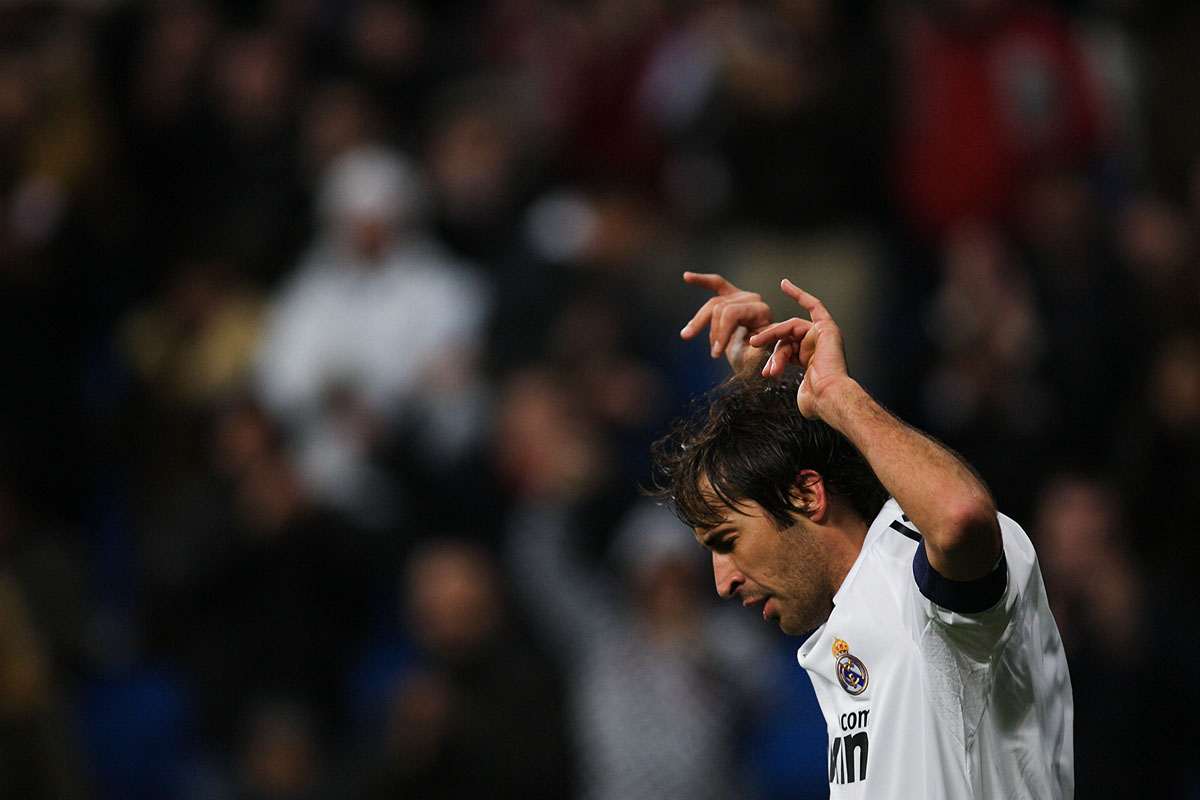
Raúl is featured in EA Sports's FIFA video game series. His distinctive goal celebration of kissing his wedding ring, a gesture of affection for his wife, appears in FIFA 18. This celebration earned him the popular nickname "Lord of the Rings," a reference to J. R. R. Tolkien's famous fantasy series.
Beyond endorsements, Raúl has taken on ambassadorial roles, serving as an ambassador for Spain's LFP in North America and working as an ambassador for the FAO. His public persona is often characterized by humility and professionalism. During a visit to Japan for a friendly match, Raúl and Fernando Morientes appeared on the Japanese variety show "Yabetchi Sushi." Raúl later commented that he found the "lawnmower" impersonation by comedian Wakky "very funny."
8. Honours and Achievements
Raúl's career is decorated with numerous team titles and individual accolades, spanning his playing and managerial endeavors.
8.1. Player Honours
Real Madrid Youth
- Dallas Cup: 1993, 1994
Real Madrid
- La Liga: 1994-95, 1996-97, 2000-01, 2002-03, 2006-07, 2007-08
- Supercopa de España: 1997, 2001, 2003, 2008
- UEFA Champions League: 1997-98, 1999-2000, 2001-02
- UEFA Super Cup: 2002
- Intercontinental Cup: 1998, 2002
Schalke 04
- DFB-Pokal: 2010-11
- DFL-Supercup: 2011
Al Sadd
- Qatar Stars League: 2012-13
- Emir of Qatar Cup: 2014
New York Cosmos
- North American Soccer League: Spring Season 2015
- North American Supporters' Trophy: 2015
- Soccer Bowl: 2015
Spain U21
- UEFA European Under-21 Championship runner-up: 1996
8.2. Managerial Honours
Real Madrid U19
- UEFA Youth League: 2019-20
8.3. Individual Awards and Records
- UEFA European Under-21 Football Championship top goalscorer: 1996
- La Liga's Breakthrough Player: 1994-95
- Zarra Trophy: 1995-96, 1998-99, 2000-01, 2002-03
- La Liga's Best Spanish Player: 1996-97, 1998-99, 1999-2000, 2000-01, 2001-02 (record)
- La Liga's Team of the Decade: 2000s
- ESM Team of the Year: 1996-97, 1998-99, 1999-2000
- Pichichi Trophy: 1998-99, 2000-01
- Copa del Rey top goalscorer: 2001-02, 2003-04
- IFFHS World's Top Goal Scorer: 1999 (2nd place: 2001, 3rd place: 2003)
- UEFA Champions League top goalscorer: 1999-2000, 2000-01
- UEFA Champions League top assist provider: 2002-03
- UEFA Club Forward of the Year: 1999-2000, 2000-01, 2001-02
- UEFA European Football Championship Teams of the Tournament: 2000
- Ballon d'Or runner-up: 2001 (also 7th in 1997, 2002, 2003; 9th in 1999, 2000)
- FIFA World Player of the Year bronze award: 2001 (also 5th in 1997; 6th in 2002; 8th in 1999, 2003)
- FIFA 100: 2004
- Trofeo Alfredo Di Stéfano: 2007-08
- Sportske Novosti award: 2001
- Marca Leyenda: 2009
- Golden Foot Award runner-up: 2009, 2010, 2011
- Goal of the Month in Germany: August 2011, March 2012, April 2012, July 2013
- Goal of the Year in Germany: 2011, 2013 (shared with Julian Draxler)
- Qatar Stars League Fair Play Award: 2013
- NASL Player of the Month: May 2015
Decorations
- Government of Spain: Gold Medal of the Royal Order of Sporting Merit 2006
- City of Madrid: Gold Medal 2009
Records
- Real Madrid Record Appearance Maker: 741 games
- Real Madrid Record Appearance Maker in La Liga: 550 games
- European Competitions Record Appearance Maker: 150 appearances (includes UEFA Cup Winners' Cup, UEFA Intertoto Cup, UEFA Europa League, UEFA Super Cup)
- Third leading scorer in the world (throughout history), according to IFFHS Statistics: 125 goals (includes other European competitive competitions and Intercontinental Cup)
- Has not received a red card in entire career.
9. Career Statistics
9.1. Club
| Club | Season | League | National cup | Continental | Other | Total | ||||||
|---|---|---|---|---|---|---|---|---|---|---|---|---|
| Division | Apps | Goals | Apps | Goals | Apps | Goals | Apps | Goals | Apps | Goals | ||
| Real Madrid C | 1994-95 | Segunda División B | 7 | 16 | - | - | - | 7 | 16 | |||
| Real Madrid B | 1994-95 | Segunda División | 1 | 0 | - | - | - | 1 | 0 | |||
| Real Madrid | 1994-95 | La Liga | 28 | 9 | 2 | 1 | 0 | 0 | - | 30 | 10 | |
| 1995-96 | La Liga | 40 | 19 | 2 | 1 | 8 | 6 | 2 | 0 | 52 | 26 | |
| 1996-97 | La Liga | 42 | 21 | 5 | 1 | - | - | 47 | 22 | |||
| 1997-98 | La Liga | 35 | 10 | 1 | 0 | 11 | 2 | 3 | 0 | 49 | 13 | |
| 1998-99 | La Liga | 37 | 25 | 2 | 0 | 8 | 3 | 2 | 1 | 49 | 29 | |
| 1999-2000 | La Liga | 34 | 17 | 4 | 0 | 15 | 10 | 4 | 2 | 57 | 29 | |
| 2000-01 | La Liga | 36 | 24 | 0 | 0 | 12 | 7 | 2 | 1 | 50 | 32 | |
| 2001-02 | La Liga | 35 | 14 | 6 | 6 | 12 | 6 | 2 | 3 | 55 | 29 | |
| 2002-03 | La Liga | 31 | 16 | 2 | 0 | 12 | 9 | 2 | 0 | 47 | 25 | |
| 2003-04 | La Liga | 35 | 11 | 7 | 6 | 9 | 2 | 2 | 1 | 53 | 20 | |
| 2004-05 | La Liga | 32 | 9 | 1 | 0 | 10 | 4 | - | 43 | 13 | ||
| 2005-06 | La Liga | 26 | 5 | 0 | 0 | 6 | 2 | - | 32 | 7 | ||
| 2006-07 | La Liga | 35 | 7 | 1 | 0 | 7 | 5 | - | 43 | 12 | ||
| 2007-08 | La Liga | 37 | 18 | 1 | 0 | 8 | 5 | 2 | 0 | 48 | 23 | |
| 2008-09 | La Liga | 37 | 18 | 1 | 3 | 7 | 3 | 2 | 0 | 47 | 24 | |
| 2009-10 | La Liga | 30 | 5 | 2 | 0 | 7 | 2 | - | 39 | 7 | ||
| Total | 550 | 228 | 37 | 18 | 132 | 66 | 22 | 11 | 741 | 323 | ||
| Schalke 04 | 2010-11 | Bundesliga | 34 | 13 | 4 | 1 | 12 | 5 | 1 | 0 | 51 | 19 |
| 2011-12 | Bundesliga | 32 | 15 | 3 | 2 | 11 | 4 | 1 | 0 | 47 | 21 | |
| Total | 66 | 28 | 7 | 3 | 23 | 9 | 2 | 0 | 98 | 40 | ||
| Al Sadd | 2012-13 | Qatar Stars League | 22 | 9 | 12 | 3 | 0 | 0 | - | 34 | 12 | |
| 2013-14 | Qatar Stars League | 17 | 2 | 5 | 2 | 5 | 0 | - | 27 | 4 | ||
| Total | 39 | 11 | 17 | 5 | 5 | 0 | - | 61 | 16 | |||
| New York Cosmos | 2015 | NASL | 28 | 8 | 2 | 0 | - | 2 | 1 | 32 | 9 | |
| Career total | 691 | 291 | 63 | 26 | 160 | 75 | 26 | 12 | 940 | 404 | ||
9.2. International
| National team | Year | Apps | Goals |
|---|---|---|---|
| Spain | 1996 | 4 | 1 |
| 1997 | 6 | 0 | |
| 1998 | 10 | 4 | |
| 1999 | 9 | 10 | |
| 2000 | 11 | 3 | |
| 2001 | 9 | 5 | |
| 2002 | 9 | 6 | |
| 2003 | 10 | 8 | |
| 2004 | 13 | 3 | |
| 2005 | 12 | 2 | |
| 2006 | 9 | 2 | |
| Total | 102 | 44 | |
9.3. Managerial statistics
| Team | From | To | Record | |||||||
|---|---|---|---|---|---|---|---|---|---|---|
| G | W | D | L | GF | GA | GD | Win % | |||
| Real Madrid Castilla | 20 June 2019 | Present | 75|59|56|288|224|+64|39.47 | |||||||
| Real Madrid U19 (caretaker) | 1 July 2020 | 31 August 2020 | 4|0|0|11|4|+7|100.00 | |||||||
| Total | 79|59|56|299|228|+71|40.72 | |||||||||
10. See Also
- List of footballers with 100 or more UEFA Champions League appearances
- List of men's footballers with 100 or more international caps
- List of men's footballers with the most official appearances
- List of Real Madrid CF records and statistics
- List of La Liga players (400+ appearances)